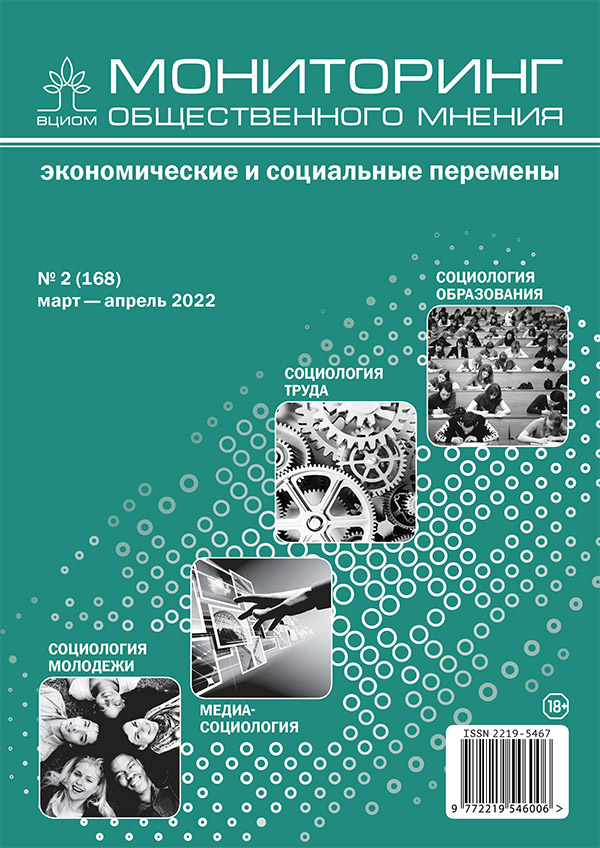Youth as a Barometer of the Future? The Youth Agenda in Contemporary Russia as Viewed by Youth Policy Experts
DOI:
https://doi.org/10.14515/monitoring.2022.2.2078Keywords:
youth agenda, youth policy experts, youth of Russia, patriotism, social engagement, futureAbstract
Youth policy as a sphere of state administration is a national project based on a generational contract between the state and the youth. The state converts available resources into the socialization of the youth, ensuring the future development of the national state and society. The formation of the youth agenda involves employees of various government agencies and institutions whose tasks include youth-related issues. Depending on priorities, youth can be seen as a resource, an object of the national state, a significant agent, a subject, and an active participant in social change. The degree of agency of various youth groups and their opportunities (rights) to influence significant decisions can be defined differently by experts, which forms different and contradictory visions of state youth policies and, accordingly, key projects aimed at the future of both the country and the youth. Based on the analysis of expert interviews (N = 30), the article aims to reconstruct the perceptions of the place and role of contemporary youth in the country’s future and the critical issues of the youth agenda as a whole. The article suggests an interpretation of three divergent expert positions, among which tension and contradiction are found. The first is an optimistic view of the future, where the relationship between the state, represented by the Youth Policy, and the youth is considered a balanced dialogue based on a shared vision of Russia’s bright future and the place and role of youth in bringing it closer. This approach is typical of upper-level Youth Policy leaders and NGOs management located in the Capital. The second is a moderately worried view of youth and the country’s future, shared by the heads of state Youth Policy agencies and NGOs in the regions. The third expert position may be described as a critical and skeptical attitude toward the key program documents of the Youth Policies and state rhetoric regarding youth. It is shared by experts in the field — employees of municipal agencies and some regional NGOs and youth researchers from both the center and the regions. The article analyzes the lines of tension between conditional clusters of expert evaluations: from the center to the periphery, from the high-rank executives of the Youth Policy and subordinate bodies to local experts, from scholars to practitioners, from state structures to NGOs.
Acknowledgments. The article utilizes the results of the project “Anti-crisis Potential of Youth Policies in Russia and Europe in the Era of Global Risks: National Imaginary, Patriotism, and Social Engagement”, which was supported by the Russian Foundation for Basic Research and Social Research Expert Institute (EISI). Project number: 20-011-31412. The results of the project “Transition to Adulthood Among Russian Youth in the 21st Century: Generational Analysis” carried out within the framework of the Basic Research Program at the National Research University Higher School of Economics (HSE University) in 2020–2022 are presented in this work. The authors use the results of discourse analysis to highlight the stages of formation of the youth policy in Russia.
We are thankful to our colleagues Alina Mayboroda, Anastasia Sablina, Yulia Epanova, Dmitry Omelchenko, Svyatoslav Polyakov, and Iskander Yasaveev, who participated together with the authors in collecting interviews and analyzing research materials.
Downloads
Published
How to Cite
Issue
Section
License
Copyright (c) 2022 Monitoring of Public Opinion: Economic and Social Changes Journal (Public Opinion Monitoring) ISSN 2219-5467

This work is licensed under a Creative Commons Attribution-NonCommercial-ShareAlike 4.0 International License.






